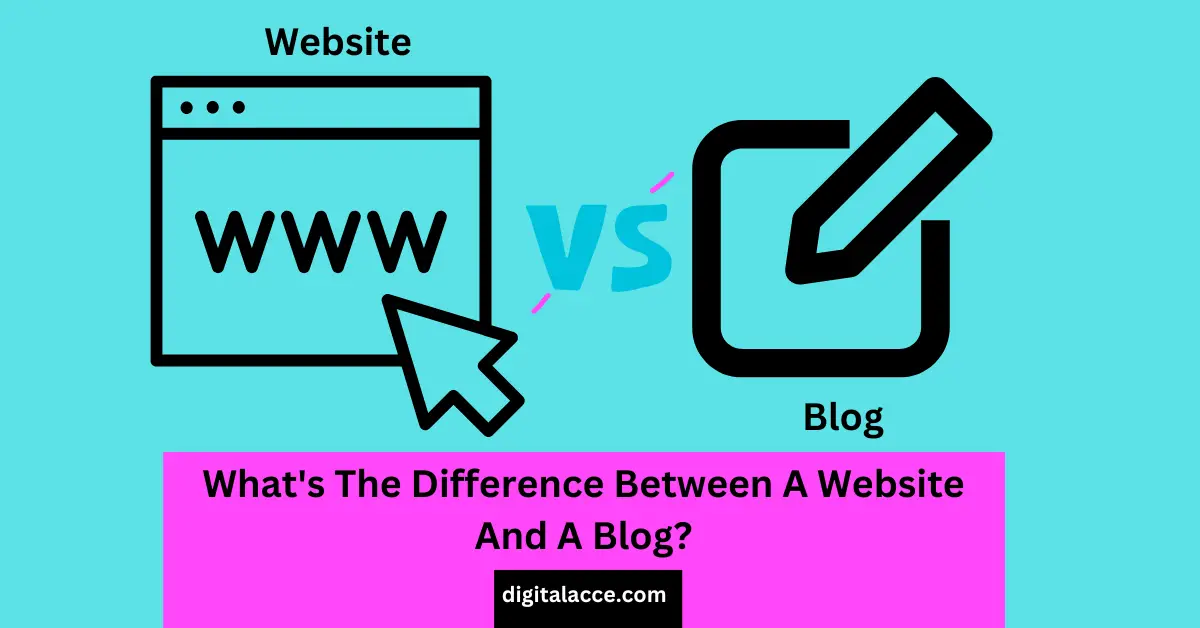Website and blog are often used interchangeably. However, there is a difference in the meaning of both terms and usage. In this article, I’ll explain to you how both differ and how to know which to use.
Also, all related queries to websites and blogs will be answered.
To start with, it is good to understand what a website and a blog mean.
Contents
- What is a Website?
- What is a Blog?
- Key Differences Between Website and A Blog
- When you should Have a Website
- When you should have a Blog
- Can I Have A Website and a Blog?
- Can I start a blog without a website?
- More Clarity on Blogs and Websites
- Can a Blog Still Be Called A Site?
- Which is better, A Blog or a Website?
- Which is more profitable, blog or website?
- Final Thought
What is a Website?
A website is a static online space that primarily showcases services rendered by a person or an organization.
To understand what a website really is, let’s consider a few examples.
Ezoic.com is a website. Let’s consider some reasons why it is a website and see how it fits into our definition of a website.
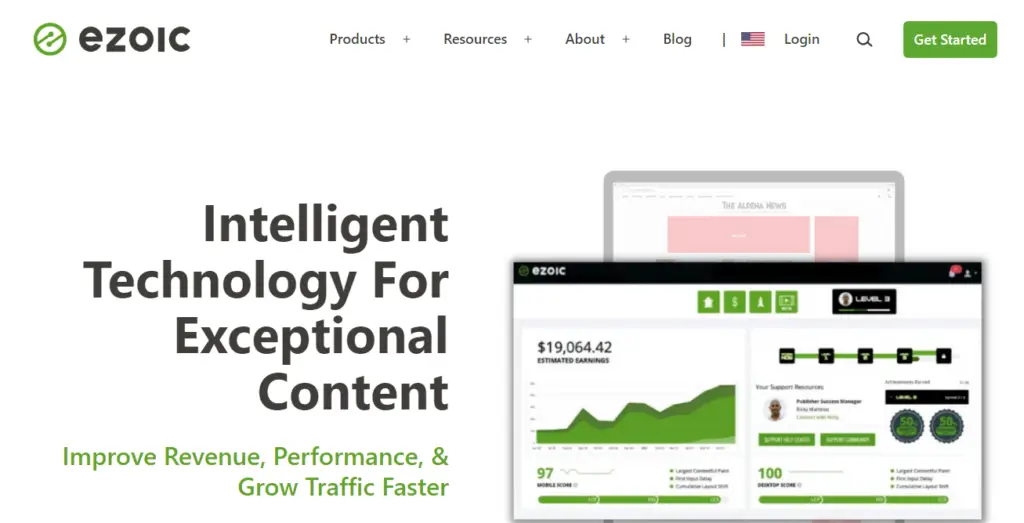
From our definition of a website, two keywords stand out:
- Static
- Showcases services
- 1. Static
Is this Ezoic.com static? Yes, it is. How? When you visit the website tomorrow or any other time, you’re likely going to see the exact same set of information there. It hardly changes.
- 2. Showcases Services
Does Ezoic.com showcase the services of the business? Yes, it does. The main idea of Ezoic.com is to let people know about the service they render – monetize blogs with display ads.
Also, you’ll notice that there is a call to action on the website (“Get started“). This is very typical for most websites.
Let’s consider another example of a website – Cloudways.com
- 1. Static
Is this Cloudways.com static? Yes, it is. How? When you visit the website tomorrow or any other time, you’re likely going to see the exact same set of information there. It hardly changes.
- 2. Showcases Services
Does Cloudways.com showcase the services of the business? Yes, it does. The main idea of Cloudways.com is to let people know about the service they render – cloud hosting service.
Also, you’ll notice that there is a call to action on the website (“Start Free Trial Now“). This is very typical for most websites.
There are thousands of other websites on the internet but with these two examples, I am sure you get the idea of what a website really means.
What is a Blog?
A Blog is an online space that publishes new content regularly. Two key things stand out here:
- New: It is called a blog when new content is published…
- Regularly: Those new content must be published regularly to qualify as a blog.
Now, let’s consider some examples of a Blog.
Digitalacce.com, for example, is a blog. How and why?
On digitalacce.com, new content is published regularly.
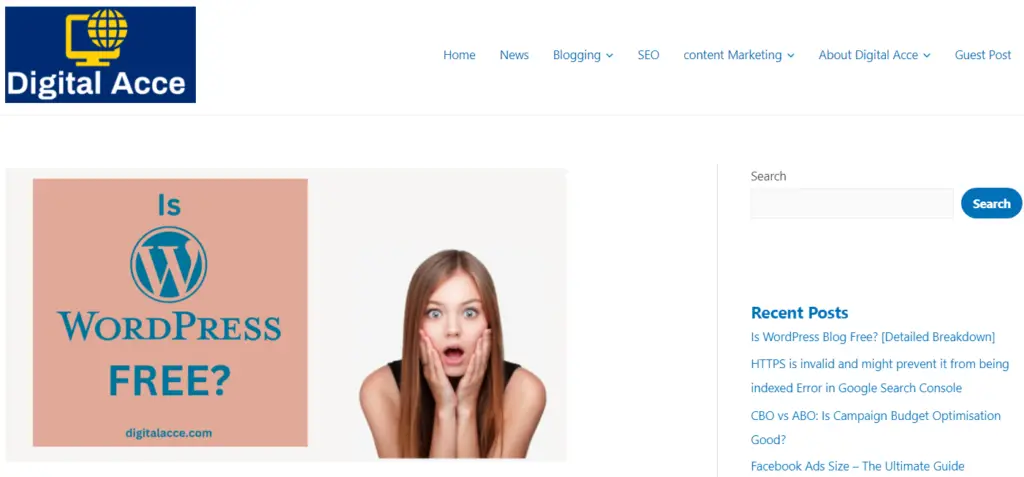
Also, you’ll notice the name of the publisher and the date each content is published.

In addition, going back to our earlier examples of a website – Ezoic.com and Cloudways.com, these two websites have a blog too.
For Cloudways, you can find their blog here – https://www.cloudways.com/blog/. Their Blog is a subdirectory of their website.
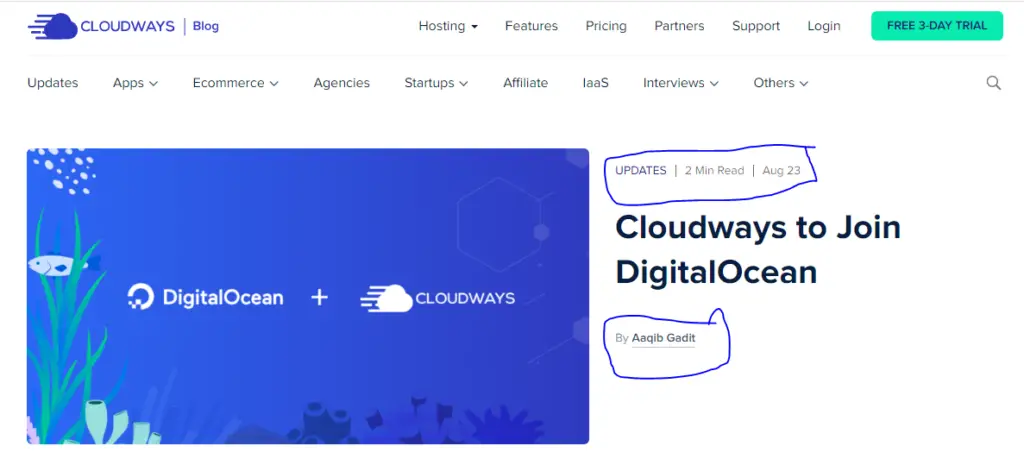
Also, you’ll notice the name of the publisher and date. These are features of a blog.
In the case of Ezoic, here is the URL to their blog – https://www.ezoic.com/blogs/. They also have their blog as a subdirectory to their website.
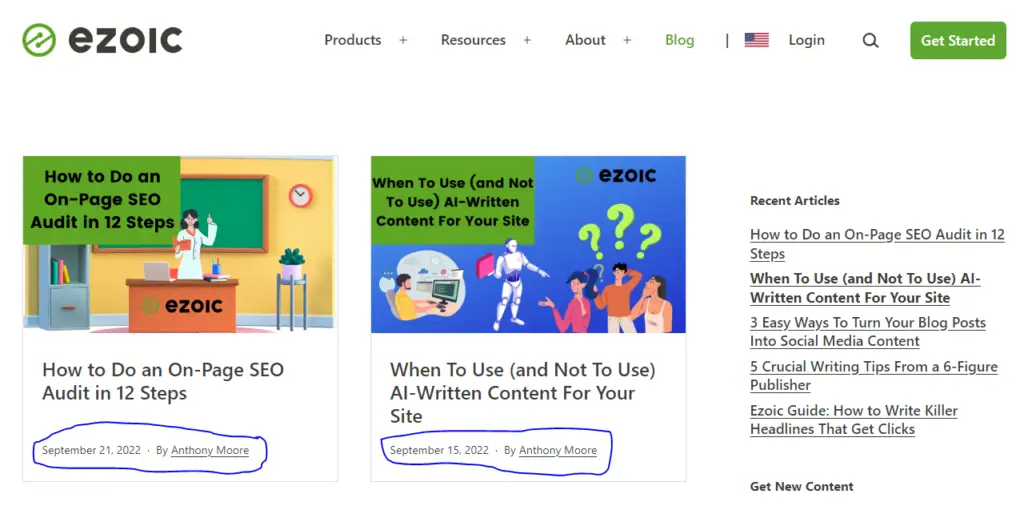
Key Differences Between Website and A Blog
A website is static and showcases services while a Blog is all about new content.
See the table below for other differences between a blog and a website.
| Website | Blog |
|---|---|
| It is static – almost no changes occur over a long period of time. | The content you see on the front page is not always the same. |
| No new content is published on a website | New content is published regularly on a blog, hence the changes on the front page from time to time |
| Author and date are never features of a Website | Almost all blogs have the author names and dates for all published content. |
| A website showcases a service or a product | A blog showcases content or articles. |
As you may have observed, there is a clear difference between a website and a blog. Now, let’s talk about how to choose which you need.
When you should Have a Website
In the following scenarios, a website is more appropriate than a blog:
- When you (or your company) offer a service or a product and need a space on the internet to let people know about it.
- A Freelancer who wants to have an online presence to showcase his portfolio
When you should have a Blog
In the following scenarios, a blog is more appropriate than a website:
- When you want to regularly publish content and share your idea about a specific industry.
- When you offer a service and want to regularly share useful information about it or other related matters to your already established audience or potential new audience.
Can I Have A Website and a Blog?
As you may have observed in our example of Ezoic.com and Cloudways.com, both are a website. But they both also have a blog. Why? Because a website and a blog have two different purposes.
So, yes, a particular person or company can have a website and a blog.
In fact, if you offer a service and already have a website, it is very much advisable to have a blog too. Why?
Publishing content regularly would drive traffic to your blog and on your blog subtly and contextually advertise your service since you’ll be covering topics your potential customers are searching for.
In addition, your existing customers may benefit from your blog because it presents them with the opportunity to learn how to use your product or educate them about your services.
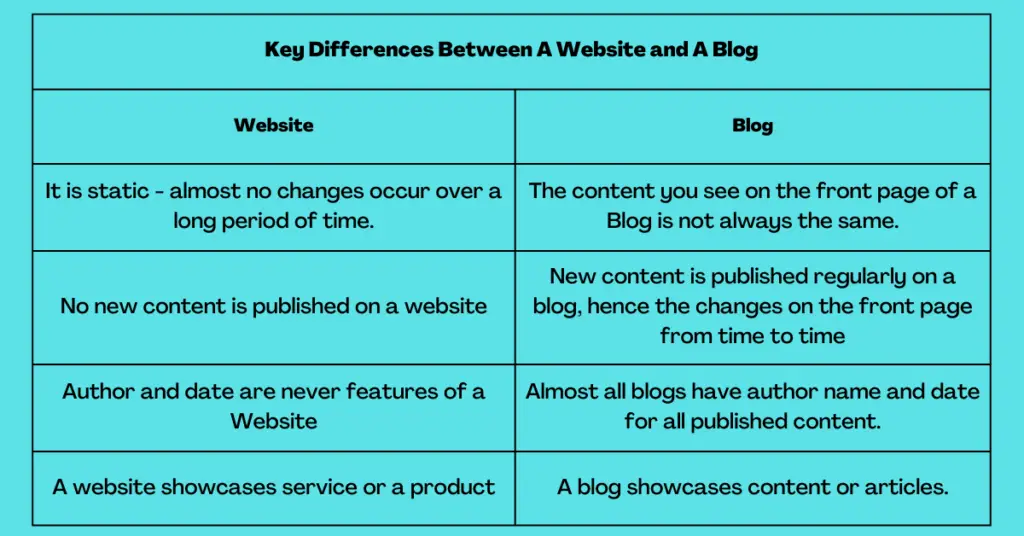
Can I start a blog without a website?
More than 80% of blogs on the internet today do not have a website or need to have one.
In fact, blogging is one of the leading reasons why people decide to buy a domain name and have an online space in the first place.
So, yes, one can start a blog without having a website. However, one should consider these scenarios discussed above to know if you need a website, a blog, or both.
More Clarity on Blogs and Websites
Given our clear definition of a Website, you may see some striking similarities with a landing page.
Yes, a website can be a landing page but not all landing pages are websites.
Wait. Let me explain.
A landing page has two goals: (1.) to educate and convince people about a product or service without distractions, and (2.) to propel readers to take an action. A website fulfills both goals but that cannot be said of a blog.
But one may argue that there are many blogs that have landing pages for a particular product or service. Yes, that’s true. But it doesn’t make that single page or the entire blog a website. It is just a landing page.
However, when a landing page features a product or service in the name of that product or service, that can be a website.
For example, on Digitalacce.com, [which is a blog, by the way,] let’s say I have a new course named SEO crash course. If my landing page has this URL path – digitalacce.com/seo-crash-course, it is just a landing page and not a website.
However, if the landing page for the course is – seocrashcourse.com, then this is a website and not a blog.
Can a Blog Still Be Called A Site?
Generally, all online web spaces are called “websites” whether it is an e-commerce site, blogs, forums, or whatever. “Website” is a general term for all.
So, coming from that angle, yes, a blog can still be called a “website” because it is a type of website in reality.
Still, there is a need to always differentiate between the two as I have done in this article, so as to avoid confusion.
Which is better, A Blog or a Website?
A Blog and a Website both have their unique functions. So, it is impossible to say that one is better than the other.
Asking to know if a blog is better than a website is like asking if a smartphone is better than a T-shirt. They serve different purposes, so it is impossible to have a clear answer.
Which is more profitable, blog or website?
Although they both serve different purposes, a website and a blog can work to complement each other.
Also, not all websites or blogs are created for the purpose of making money and you can find out how long this may take to start earning a full-time income from it.
Again, it is impossible to say that a blog is more profitable than a website or vice versa. However, it is much easier to directly monetize a blog than a website, especially with display ads.
Final Thought
The difference between a website and a blog is clear. A website is static, and hardly changes or showcases services or portfolios. But a blog, on the other hand, showcases content or articles.
Although in other cases, the term “website” or ‘site’ can be used to generalize all kinds of online spaces – including blogs, it is still important to differentiate both.
Whatever you choose, whether a blog or a website, you’ll need a good hosting service. I can only recommend Cloudways because it offers cloud-based servers to power your site in the safest and fastest way.
Read to understand the difference between Cloud hosting and regular web hosting.
If you enjoyed this article, you’re likely going to enjoy reading the 3 most important aspects SEO, the best Facebook Ad strategies to promote your website (or blog), and the various ways to monetize a website or blog.

